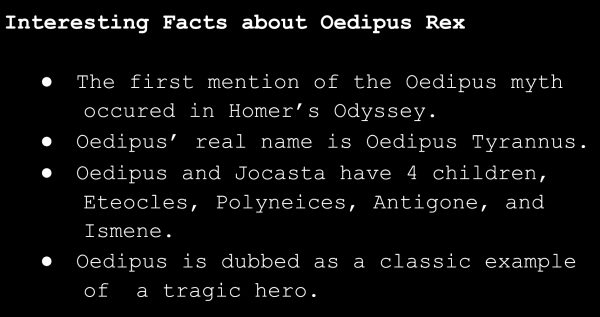
Having studied a year of psychology as a part of being in the legal magnet program, I had learned about the Austrian psychoanalyst Sigmund Freud. At the same time, I was taking English II Honors with Dr. Suarez where we were reading a play, the Greek tragedy of Oedipus Rex.
The concept of the Oedipus complex is known to many. Developed by Freud, the Oedipus complex postulates that individuals experience unconscious feelings of desire for their opposite-sex parent and rivalry with their same-sex parent. The concept derives its name from the Greek tragedy Oedipus Rex by Sophocles, where the titular character ends up unconsciously fulfilling a prophecy by marrying his mother and killing his father.
However, if one were to actually review the text, it would reveal contradictions between Freud’s Oedipus complex and the tragic narrative of Oedipus Rex.
Freud’s Oedipus complex developed in the late 19th and early 20th centuries, proposing that during the phallic stage of psychosexual development, young boys experience subconscious sexual desires for their mothers and harbor rivalry with their fathers. This theory, although controversial, has played a significant role in shaping psychoanalytic thought and understanding human behavior. Many have questioned its legitimacy, but only in the moral level. Not many Miami High students have ever dug deeper to find how much this theory actually has to do with the Greek Story.
Oedipus Rex presents a tale of fate, prophecy, and inevitable tragedy. Oedipus, the king of Thebes, seeks to find out the mystery behind the city’s suffering. In a cruel twist of fate during his attempt, Oedipus discovers that he is the unwilling chosen one of the prophecy, having fulfilled the prediction by unknowingly marrying and laying with his mother, Queen Jocasta, and slaying his father, King Laius. This is the reason why so many regard it as the theory of incestuous attraction. But this is the wrong way of looking at the story.
The contradiction comes from the fact that Oedipus, in the tragedy, is unaware of the identities of his parents when he fulfills the prophecy. Freud’s complex, on the other hand, relies on conscious or subconscious recognition and attraction to parental figures. Oedipus’s actions, driven by a desire to escape his destiny, lead him into a tragic sequence of events where he unknowingly fulfills his fate, which isn’t exactly on par with the central idea of the Oedipus complex.
Furthermore, the aftermath of Oedipus’s realization and the tragic consequences he faces diverge largely from Freud’s theory. In the play, upon discovering the truth, Oedipus gouges his own eyes out as an act of self-punishment, and Jocasta hangs herself due to the guilt and horror of the situation and her actions. These actions go beyond the scope of Freud’s Oedipus complex, as they involve extreme forms of self-mutilation that defy the natural feeling in the Freudian theory.
While Freud’s Oedipus complex has been influential in understanding human development and behavior, the contradictions between the theory and the narrative of Oedipus Rex highlight the limitations while applying psychoanalytic concepts to literary works. Greek stories were never supposed to be taken as morally right, and even less used to explore human psychology.













